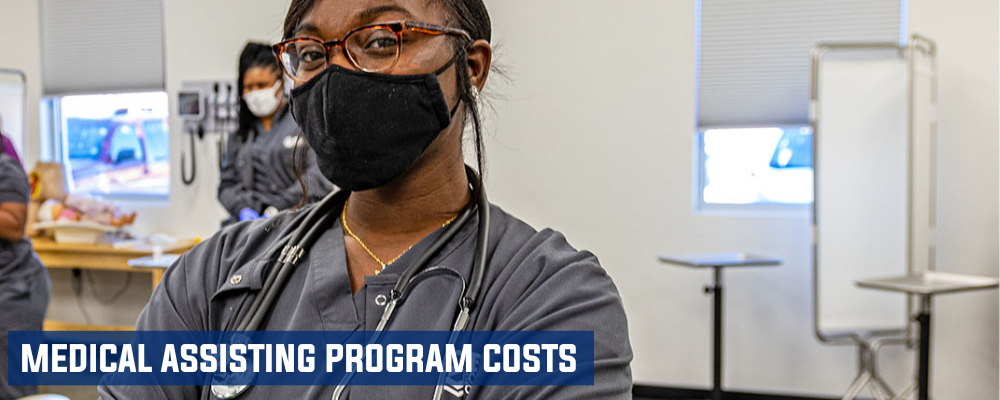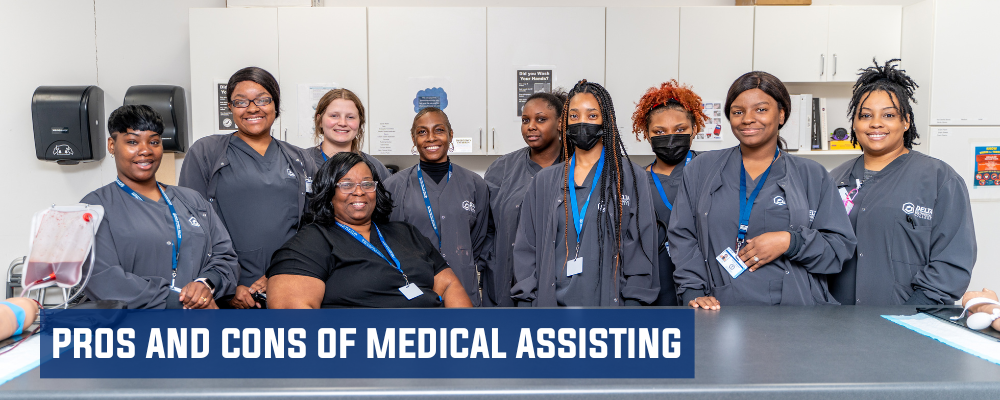A medical assistant is an allied health professional who performs a mix of clinical and administrative tasks. Medical assistants help a medical facility, such as a physician’s office, run smoothly and efficiently. The job outlook for these allied health professionals is considered strong. The U.S. Bureau of Labor Statistics predicts that medical assistant job growth will increase as much as 14 percent through 2032, compared to the average growth rate for all occupations at 3 percent.
If you are interested in pursuing this career, you might be wondering how long it takes to become a medical assistant. Although the exact amount of time can vary, it typically takes nine months to two years for most aspiring medical assistants. Becoming a medical assistant involves a number of steps, including graduating from high school, acquiring medical assistant training, and obtaining certifications.
How Long is a Medical Assistant Program?
Although the exact amount of time can vary, it typically takes nine months to two years for most aspiring medical assistants to complete their postsecondary education. Becoming a medical assistant involves a number of steps, including graduating from high school, acquiring medical assistant training, and obtaining certifications. The vast majority of medical assistants complete a postsecondary medical assisting training program, but some individuals may also elect to enter the profession through on-the-job training. However, employers usually prefer candidates who have finished a medical assisting program. Medical assisting training programs are offered by vocational schools, community colleges, and universities. Students can receive a certificate, diploma, or associate degree. As mentioned above, these various educational routes vary in length. Learn more about specific program lengths associated with each path below:
High School/GED
Most states do not have any formal educational requirements for medical assistants, but a high school degree or GED certificate is usually needed for both postsecondary education and on-the-job training. High school students who are interested medical assisting should consider taking courses in biology, chemistry, and anatomy. Business and computer classes will likely also be helpful. It normally takes four years to finish high school and about three months to get a GED certificate.
On-The-Job Training
Most states do not have any formal educational requirements for medical assistants, but a high school degree or GED certificate is usually needed for both postsecondary education and on-the-job training. High school students who are interested medical assisting should consider taking courses in biology, chemistry, and anatomy. Business and computer classes will likely also be helpful. It normally takes four years to finish high school and about three months to get a GED certificate.
Postsecondary Education
Vocational schools, community colleges, and universities offer medical assisting programs. These formal training programs characteristically consist of classroom instruction and hands-on practice. Students receive instruction in clinical procedures, office administration, first aid, and instrument care. These programs last between nine months and two years, depending on the path you take.
Medical Assistant Certifications
Certifications allow medical assistants to showcase their skillset and expertise. There are a number of certification bodies that offer credentials to medical assistants. Some certification exams may be taken while in training or shortly after graduation, whereas others require a certain amount of work experience. Most states do not demand medical assistants be certified, although some employers might prefer job candidates who have such qualifications.
What Does it Take to Become a Medical Assistant?
Postsecondary medical assisting programs vary in length, depending on which educational institution you attend. Vocational school programs are usually shorter than community college or university programs. So, what does it take to become a medical assistant? For those initially seeking certification, the first step may be determining their preferred educational path forward. Let’s take a closer look:
Vocational School
Medical assisting programs at vocational schools can often be completed in less than a year. Delta Technical College (DTC)’s medical assistant training program is nine months. The program emphasizes medical assistant essentials, such as phlebotomy, patient preparation, physical exam assistance, office management, medical billing and coding, life span care, and medical ethics. Students graduate with a diploma.
Community College/University
Medical assistant programs at community colleges and universities cover similar topics as vocational school programs, yet community colleges and universities also require students to enroll in general education classes like Math or English. These programs typically last two years, though some students may need longer to graduate. Community colleges offer varying academic degrees. Depending on the student’s course of study and the individual school’s offerings, upon graduation a student could earn an associate’s degree, diploma, certificate or even a bachelor’s degree.
How Hard is Medical Assistant School?
Experiences in education are subjective-whether you personally find schooling for medical assistants difficult may be influenced by several unique factors. For example, individuals who are naturally drawn to subjects like biology and anatomy may report less difficulty when pursuing medical assistant certifications. According to the U.S. BLS, medical assistants are typically asked to be analytical and detail oriented-other important qualities include interpersonal and technical skills.
So, is it hard to become a medical assistant? Whether you already possess some of these skills may shape your opinion. Medical assisting training programs that include hands-on training provide students with various opportunities to work alongside instructors with real-world experience. Within a classroom and laboratory setting, students develop the technical skills they need to pursue an entry-level career in allied health.Delta Technical College (DTC) is committed to every student’s success. DTC’s Student Success Specialists (SSS) assist students throughout all phases of their education, providing one-on-one support as needed. Among the many student services offered, the SSS helps connect students with instructors for additional tutoring upon request or whenever a need is identified.
How to Get Medical Assistant Certification
There are several certifications available to medical assistants. Each certification has its own set of eligibility criteria. These can include graduation from a medical assistant training program, full-time work experience as a medical assistant, or completion of medical assistant training in the military. How long it takes to attain such a certification depends on what type of credential to seek and what kind of eligibility criteria apply to you. Certifications for medical assistants include:
- National Certified Medical Assistant (NCMA) from the National Center for Competency Testing
- Certified Medical Assistant (CMA) from the American Association of Medical Assistants
- Registered Medical Assistant (RMA) from American Medical Technologists
- Certified Clinical Medical Assistant (CCMA) from the National Health Career Association
- Certified Medical Administrative Assistant (CMAA) from the National Health Career Association
For medical assistant certification, Delta Technical College (DTC) prepares students to take the National Center for Competency Testing (NCCT) National Medical Assistant (NCMA) Certification Exam.
Starting Your Career: Life as a Medical Assistant
Becoming a medical assistant involves several steps, from getting a high school degree (or equivalent) to obtaining industry certification. Since aspiring medical assistants can choose between various educational paths, the time it takes to become a medical assistant can differ quite a bit. For those who pursue the path of a medical assistant training program following graduation from high school, for example, they can complete their training in less than a year at Delta Technical College (DTC).
How Many Hours Does a Medical Assistant Work?
According to recent figures from the U.S. BLS, the majority of medical assistants work full-time. As certain medical facilities may remain open at all hours, certified medical assistants can work evenings, weekends, and holidays. Work environment is a key consideration when determining hours and scheduling. The majority of medical assistants serve roles within physician offices that typically observe standard clinical hours.
If you have questions regarding the career path of a medical assistant, contact our helpful Admissions Team to talk about your career goals.
SOURCES
- https://www.bls.gov/ooh/healthcare/medical-assistants.htm#tab-6
- https://www.bls.gov/ooh/healthcare/medical-assistants.htm#tab-4
- https://www.bls.gov/ooh/healthcare/medical-assistants.htm#tab-3


